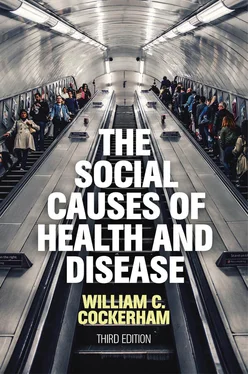247 242
248 243
249 244
250 245
251 246
252 247
253 248
254 249
255 250
256 251
257 252
258 253
259 254
260 255
261 256
262 257
263 258
264 259
265 260
266 261
267 262
268 263
269 264
270 265
271 266
272 267
273 268
274 269
275 270
276 271
277 272
278 273
279 274
280 275
To Cynthia
The Social Causes of Health and Disease
Third Edition
William C. Cockerham
polity
Copyright © William C. Cockerham 2021
The right of William C. Cockerham to be identified as Author of this Work has been asserted in accordance with the UK Copyright, Designs and Patents Act 1988.
First edition published in 2007 by Polity Press
Second edition published in 2013 by Polity Press
This third edition first published in 2021 by Polity Press
Polity Press
65 Bridge Street
Cambridge CB2 1UR, UK
Polity Press
101 Station Landing
Suite 300
Medford, MA 02155, USA
All rights reserved. Except for the quotation of short passages for the purpose of criticism and review, no part of this publication may be reproduced, stored in a retrieval system or transmitted, in any form or by any means, electronic, mechanical, photocopying, recording or otherwise, without the prior permission of the publisher.
ISBN-13: 978-1-5095-4037-2
A catalogue record for this book is available from the British Library.
Library of Congress Cataloging-in-Publication Data
Names: Cockerham, William C., author.
Title: The social causes of health and illness / William C. Cockerham.
Other titles: Social causes of health and disease Description: Third edition. | Cambridge, UK ; Medford, MA : Polity Press, 2020. | Includes bibliographical references and index. | Summary: “Leading medical sociologist investigates the social factors that determine our health”-- Provided by publisher.
Identifiers: LCCN 2020015573 (print) | LCCN 2020015574 (ebook) | ISBN 9781509540358 (hardback) | ISBN 9781509540365 (paperback) | ISBN 9781509540372 (epub)
Subjects: LCSH: Social medicine. | Health--Social aspects. | Diseases--Social aspects.
Classification: LCC RA418 .C658 2020 (print) | LCC RA418 (ebook) | DDC 362.1--dc23
LC record available at https://lccn.loc.gov/2020015573LC ebook record available at https://lccn.loc.gov/2020015574
The publisher has used its best endeavors to ensure that the URLs for external websites referred to in this book are correct and active at the time of going to press. However, the publisher has no responsibility for the websites and can make no guarantee that a site will remain live or that the content is or will remain appropriate.
Every effort has been made to trace all copyright holders, but if any have been overlooked the publisher will be pleased to include any necessary credits in any subsequent reprint or edition.
For further information on Polity, visit our website: politybooks.com
For more than three-quarters of a century, medical sociology has evolved as a subdiscipline of mainstream sociology. In the beginning, it was more indebted to medicine than sociology for its support, even though the field evolved into one of the most popular sociological specialties. Time invariably brings change, and medical sociology has indeed changed since its inception. The old claim that medical sociology is atheoretical has been definitively quashed; there is now even a specialized journal ( Social Theory & Health ) and books on the topic. Sociological theory has become one of the most essential and distinctive research tools in the field.
Moreover, medical sociology has positioned itself to provide even more precise and extensive analyses of the social aspects of health and disease. The first edition of this book represents one of the first treatises of the twenty-first century describing a new direction for research – namely, the investigation of the social determinants of health – that as predicted has become commonplace. This third edition follows up on that argument. The book begins with the notion that society can make you sick and then explains how this happens.
The revised book is a continuing extension of a lecture I presented at the University of Montreal on a cold, grey, slushy, wet Canadian afternoon long ago in January 2006. This presentation was part of the university’s “Alexis de Tocqueville: Questions on American Society” lecture series. Arnaud Sales of the Sociology Department and Andrée Demers of Groupe de recherche sur les aspects sociaux de la santé et de la prevention (GRASP) were wonderful hosts. In preparing for this lecture, I wanted to look forward in discussing medical sociology and focus on the future rather than the present or past. It seemed clear that the current state of theory and developments in statistics for multilevel and longitudinal analyses allows medical sociologists to better assess the effects of different layers of social structure on the health of individuals. This not only forecasts a greater concern with structure in our future work, but will also permit us as a community of scholars to further uncover the social mechanisms that cause health and disease. This book represents a continuing step in that direction.
I would like to acknowledge the assistance of Jonathan Skerrett, the sociology editor for Polity in Cambridge, England, for his continued high level of professionalism and insightful strategies for revisions concerning this manuscript. Also, I would like to acknowledge the contributions of Karina Jákupsdóttir, the assistant sociology editor in the production of the manuscript.
Mike Bury, Emeritus Professor of Sociology at Royal Holloway University London, was a stalwart critic as a reviewer for Polity on the first edition. His detailed comments helped sharpen the book’s thesis, and he went beyond reviewing to make many cogent and lasting suggestions that proved to be extraordinarily helpful. I would like additionally to acknowledge former University of Alabama at Birmingham doctoral students Brian Hinote, Jason Wasserman, Carrie Betcher, and Katie McIntyre, who provided important assistance for various editions of this book. Anonymous reviewers for Polity likewise provided very helpful comments. I would also like to acknowledge the library resources and support of the sociology departments at UAB and more recently at the College of William & Mary which proved significant in supporting this work. Finally, I would like to thank my wife, Cynthia, for her continued support. Time and time again, as noted previously, she has proven herself to be an intelligent, insightful, and wry observer of the human social condition.
William C. Cockerham
Williamsburg, Virginia
1 The Social Causation of Health and Disease
The capability of social factors to make people ill seems to be widely recognized by the general public. Ask people if they think society can make them sick, and the probabilities are high they will answer in the affirmative. Stress, poverty, low socioeconomic status, unhealthy lifestyles, and unpleasant living and work conditions are among the many inherently social variables typically regarded by lay persons as causes of ill health. However, with the exception of stress, this view is not expressed in much of the research literature. Studies in public health, epidemiology, behavioral medicine, and other sciences in the health field typically minimize the relevance of social factors in their investigations. Usually social variables are characterized as distant or secondary influences on health and illness, not as direct causes (Link and Phelan 1995, 2000; Phelan and Link 2013). Being poor, for example, is held to produce greater exposure to something that will make a person sick, rather than bring on sickness itself. However, social variables have been found to be more powerful in inducing adversity or enrichment in health outcomes than formerly assumed. Society may indeed make you sick or, conversely, promote your health.
Читать дальше












